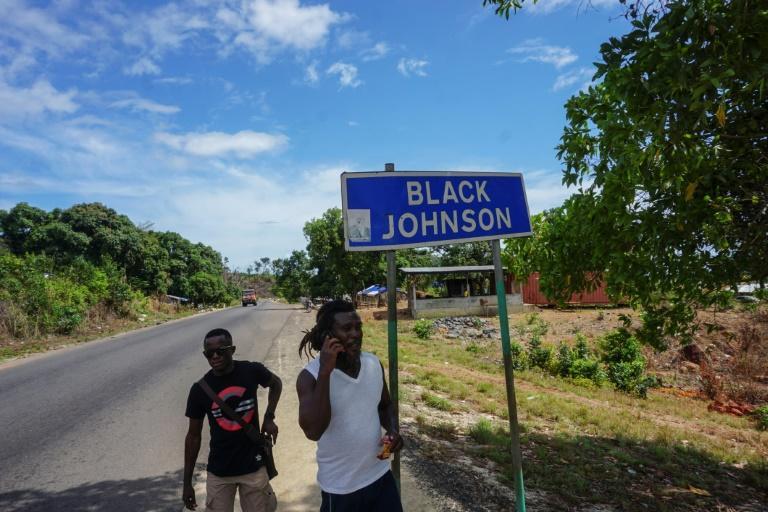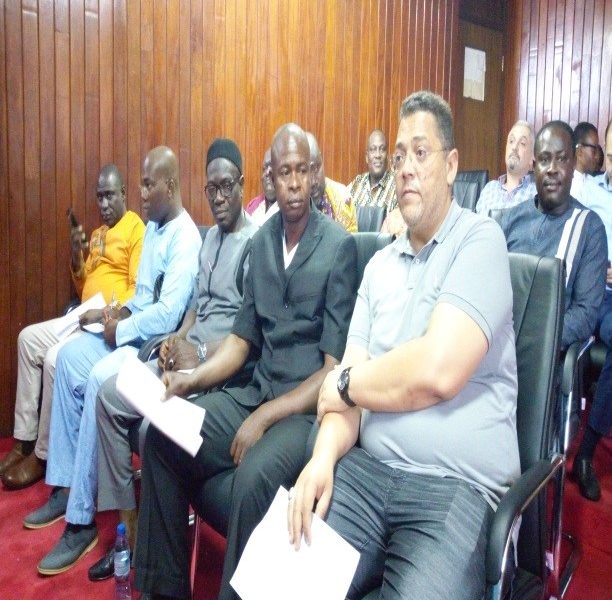President Koroma buoys up Fisheries and Marine Resources Ministry
President Ernest Bai Koroma on 4 March 2010 demonstrated great interest in the activities and operations of the Ministry of Fisheries and Marine Resources (MFMR), saying that “Government places high priority on this sector as a growth sector with a huge potential for contribution to food security, employment and fiscal returns.â€
Speaking to national stakeholders of the sector, particularly fishing operators and agents, fishermen and fisherwomen, at a special ceremony at State House with regards its importance to the Agenda for Change and the need for compliance to the Ministry’s laws, President Koroma said this was a follow-up meeting to the one he had held with officials and staff of the Ministry in August 2009, as “it is my duty as Head of State and Government to ensure proper governance of the sector.â€
Despite progress made thus far, the President noted that “the potential of this sector has never been fully realized†due to management problems and a kind of conspiracy and connivance between some officials and fishing companies to deprive the state of much-needed resources and revenue. But he reminded of his previous statement in Parliament, that his government would continue to take a robust response “to the reckless operations of illegal fishing trawlersâ€, citing the example of the latest two unlicensed vessels arrested last week. The Head of State lamented that the local fishing industry is yet to access the European Union (EU) market, as Sierra Leonean fish or fish shipped from Sierra Leone are officially banned from entering or being sold in Europe due to sub-standard processing facilities. He however noted that Sierra Leonean fish yet still reach the EU market through illegal international fishing vessels poaching on our waters, by which the sector loses about twenty four million US dollars ($24 M) annually. He then called for an end to the practice and a change of attitudes, which would be backed by stringent monitoring of the sector in accordance with laid-down rules, procedures, and laws: “If there’s a need to review our laws, then we would have to review them.â€
On a high point though, President Koroma noted that there has been steady progress since he assumed power, and that his government would embark on a proper restructuring of the sector. He noted that already four modern jetties are being constructed at different locations in the country – Goderich, Tombo, Shenge, and Bonthe – expected to be commissioned this year, while more fishery-related projects would be embarked on to ensure the provision of fish for both the local and international markets. Sounding positive, President Koroma noted the fact that there has been increased revenue collection in the year under review as eleven billion leones (Le 11 b) was collected as against a projection of four billion leones (Le 4 b). He thereby thanked all those who contributed to the increase, especially the Ministry, the Navy, development partners and volunteers who collaborated, with energy and motivation, to surveillance our territorial waters.
Other major highlights of the President’s speech included the following:
1Â Â Â Â Â Â Â Payment of licence and royalty fees for fishing vessels
- All payments of fees for fishing licences and royalties must be in US dollars, payable in bank draft to the Bank of Sierra Leone. A commitment to licence every fishing vessel and fish carrier for a 12-month period, but payable in four quarterly periods, should be signed between the Ministry of Fisheries and Marine Resources (MFMR) and the fishing companies.
- All fish processing establishments must obtain authorization from the Ministry after payment of full licence fees
- Â All fish discharge/landing fees should be paid to the MFMR by industrial fishing vessels
- Levies on fish export should also be paid to the MFMR
- There will be no concessions on either fishing licence or royalty fees.
- There should be no fishing authority
2. Measures to minimize incidental (bycatch) of fish in shrimp trawlers
- Recognizing that trawling for shrimps will always invariably result in the exploitation of some fish species, the law requires that the weight of bycatch in shrimp trawlers should not be more than 20 % of the total production from shrimp trawlers.Â
- The captains of these shrimp trawlers are deliberately targeting fish in view of their knowledge of the distribution of shrimp and fish species in the environment.
- Modifications to the trawl gears are being done so that fishing efforts can be switched easily between fishing for shrimps and fishing for fish.
- 70 % of the total bycatch by weight in excess of the stipulated quantity will be forfeited to the Government
- If the situation did not improve after six months, 100 % of the bycatches in excess of the stipulated quantity shall be confiscated by the state.
- 3.     Transshipment and inspection AT Government wharf point
- The law postulates fish-landing obligations for all categories of fishing vessels, and this regulation can only be enforced correctly by first ascertaining the total quantities of fish onboard, to ascertain the amount to be transshipped for export and the required amount to be landed to satisfy local market requirements.
- All transshipment and inspection activities for fishing vessels must henceforth take place at the Government Wharf Point.Â
- All vessels are expected to be in full compliance with the requirements for licensing, including pre-licensing inspections, production of international tonnage certificate, vessel hygiene, certificate of ownership, insurance, proper call-signs with correct dimensions etc
- 4.     Ban on pair trawling
Pair trawling is a dangerous fishing activity that has been disallowed in most countries within the West African sub-region because of its negative impact on the sustainability of the fish stocks. The practice is banned with immediate effect.
- 5.     Proper label of packaging materials
It is disheartening to note that packing materials for packaging fish and fish products are given false origin of catch, though the products originate from Sierra Leone. This practice should be discontinued.
- 6.     Compliance with both national and international regulations
- FAO port state measures and EU regulations to deter, prevent and eliminate illegal, unreported and unregulated fishing practices must be fully adhered to.
- ICCAT procedures for registration of tuna fishing vessels should be followed and these include vessel inspections, placement of fisheries observers, submission of monthly catch returns, availability of vessel specifications and submission to ICCAT
- 7.     Partnership agreement between local fishing agents and overseas partners
The agreement or MOU between local fishing agents and their overseas partners should be very transparent
- 8.     Payment of fisheries observers
The government is taking necessary steps to ensure that Fisheries Observers are paid by Government. The MFMR should collaborate with the Ministry of Employment and Labour in the recruitment of Fisheries Observers
In a short introductory speech earlier, the Minister of Fisheries and Marine Resources, Haja Afsatu Olayinka Kabba, expressed delight at the good attendance of fishing stakeholders, asserting that “When I took up office, my intentions included running a very transparent Ministry which could serve as one of the biggest bread baskets of Sierra Leone. In that light, I urged my staff to put our shoulders to the wheel to make the difference, for which you now see eleven billion leones. Our gathering here today demonstrates the participatory approach in fisheries management that I have endeavoured to promote during my tenure as minister…â€
She called for understanding and cooperation in the coming months, in “forging credible partnerships…for equitable national developmentâ€, while thanking the President for having enormous interest in the Ministry’s activities, and underlining her commitment in his vision to develop the fishing industry.
The meeting was chaired by the Minister of Presidential and Public Affairs, Joe Koroma, while a member of the Sierra Leone Industrial Fishing Association gave the vote of thanks and pledged, on behalf of his colleagues, to henceforth adhere to the law and cooperate in the efforts to transform the sector and the country.
Stay with Sierra Express Media, for your trusted place in news!
© 2010, https:. All rights reserved.





